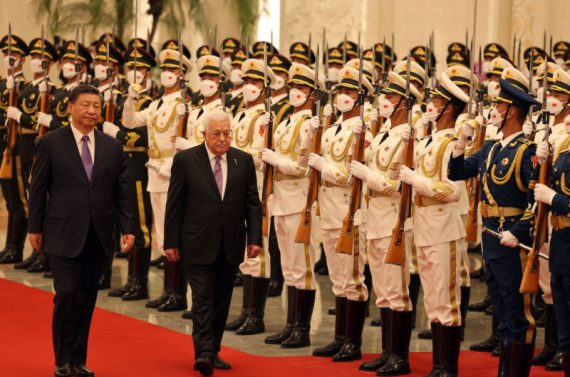A
fter a seven-year diplomatic rupture between Iran and Saudi Arabia, negotiations between the foreign ministers of the two countries were held in Beijing in March 2023 to cease hostilities and restore bilateral relations.
In 2016, Saudi Arabia severed ties with Iran after an assault on the Saudi embassy in Tehran by Iranian protesters following the execution of Shia cleric Sheikh Nimr al-Nimr. Bilateral relations between the two regional powers have further deteriorated due to proxy wars and missile strikes ever since. In 2021-2022, a series of Iraq- and Oman-brokered informal negotiations took place between Saudi Arabia and Iran aimed at the re-establishment of diplomatic relations.
Extending Iraq and Oman’s mediation between 2021 and 2022, President Xi Jinping offered China’s mediation to resolve the conflict between the two sides.
As a consequence of the China-brokered Saudi-Iranian deal in March 2023, Saudi Arabia and Iran agreed to reopen diplomatic missions and lift restrictions on direct flights in two months’ time. Hajj flights between Iran and Saudi Arabia started to run from 21 cities presently and negotiations to expand the network of direct flights beyond the hajj season are underway.
The foreign ministers of the two countries jointly stated that “technical teams will continue coordination to examine ways of expanding cooperation, including the resumption of flights and bilateral visits by official and private sector delegations, and facilitate the issuance of visas to citizens of the two countries.”
Iranian Foreign Minister Hossein Amir-Abdollahian wrote on Twitter that the negotiations with his Saudi counterpart were generally “positive” and that “emphasis on stability, stable security and development of the region” were among the issues on the agenda.
Additionally, Iran and Saudi Arabia decided to revive the Security Cooperation Agreement (2001) and the Comprehensive Cooperation Agreement (1998). Iran signed these agreements with Saudi Arabia during the era of former reformist president Mohammad Khatami.
China’s mediation offer for the Palestine-Israel conflict
After brokering the Saudi-Iranian deal, China intensified its mediation diplomacy to increase its political capital in the Middle East. Chinese Foreign Minister Qin Gang offered to mediate peace talks between Israel and Palestine in phone calls to Israeli Foreign Minister Eli Cohen and Palestinian Foreign Minister Riyad al-Maliki in April 2023.
China stepped in amid the expansion of Jewish settlements in the West Bank and the rise of the far right in Israel. However, the internal divisions between Palestinian factions undermine the prospect of a deal at present.
China’s renewed mediation offer, consisting of a three-point proposal, was made by President Xi as Palestinian Authority President Mahmoud Abbas arrived in Beijing on June 14 for a four-day visit.
At the start of their meeting, Xi told Abbas that “we are good friends and partners” and “we have always firmly supported the just cause of the Palestinian people to restore their legitimate national rights.”
A lasting solution to the Palestinian-Israeli conflict
Xi went on to say that a lasting solution to the Palestinian-Israeli conflict lies in the establishment of an “independent Palestinian state based on the 1967 borders with East Jerusalem as its capital,” referring to the UN Security Council Resolution 242.
As a result of the Xi-Abbas talks, China and the Palestinian Authority (PA) established a strategic partnership. Xi said the strategic partnership with the PA was an “important milestone in the history of bilateral relations.”
Abbas noted that his government “looks forward to strengthening cooperation” and “securing investment” under the strategic partnership with China.
On July 27, 2023, China extended an invitation to Israeli Prime Minister Benjamin Netanyahu for an official state visit. The invitation coincided with China’s intermediary diplomacy in the Middle East and rising tensions between the Biden administration and Netanyahu’s government. Netanyahu did not comment on whether and at what point in time the trip to China will take place. Hence, Israel’s stance on China’s renewed mediation offer has yet to become clear.
Recommended
Is China replacing the United States in the Middle East?
Experts on the Middle East have told Reuters that China mediating between Iran and Saudi Arabia, and Israel and Palestine might stabilize the war-torn region.
According to Aaron David Miller, a senior fellow at the Carnegie Endowment for International Peace and former Middle East policy advisor for the State Department, Chinese engagement in the Saudi Arabia-Iran rapprochement and the Israeli-Palestine are in conflict with the U.S. influence in the region, which is quickly diminishing. In line with this perception, a Middle Eastern official told Politico that the U.S. is viewed as leaving the Middle East and China is stepping in.
However, the extent to which China’s mediation diplomacy will continue as a mediating actor in the Middle East, and how the U.S. will respond to the geopolitical challenge posed by China, remains an open question.





